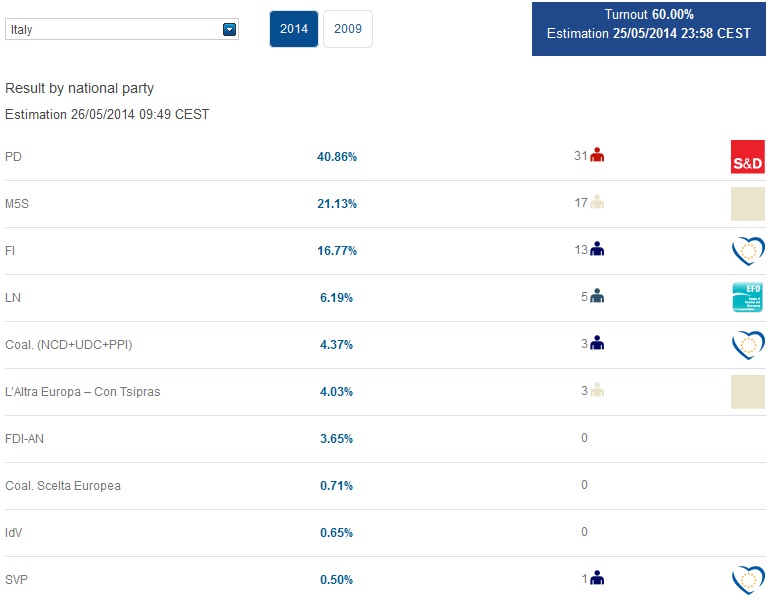Ready, set, go. The countdown to the most important debate of these European elections was marked by an enormous timer behind the five candidates to the Commission Presidency. Each had a podium, set up in the hall of the European Parliament in Brussels, each trying to get as many votes as possible, without exceeding strict television times.
Martin Schulz for PES, Jean-Claude Juncker for EPP, Ska Keller for Greens, Guy Verhofstadt for Democrats and Liberals and Alexis Tsipras for European Left: this time it was the all of them, unlike the previous debates, trying to convince voters of the 25 May elections.
Clear rules explained by the moderator, the Italian Monica Maggioni, RaiNews24 Director. Each candidate had one minute for each answer, and three wild cards to be played in case they wanted to reply to someone else’s answer.
The hall was not completely packed, even though a remarkable number of journalists were milling around the entrance more than one hour before the opening – yet several seats remained empty. The first rows were reserved for politicians, aides and supporters, while the press was “behind the front line.”
A dogged rhythm since the very beginning, even though the tones were kept calm for all the 90-minute debate. Schulz, at the centre of the stage, was perfectly comfortable with his red tie and his role of “old good politician” and did not exceed his minutes. Prepared and self-confident, he even answered Ms Maggioni with a joke: “Are you asking me whether the next President of the European Commission will be one of us? Well, I can tell you he’s here, you are talking to him.”
Verhofstadt, the histrionic, was supported by the audience and very aware of himself and his rhetoric capabilities, talked directly to the public and blamed his colleagues. At the final speech, he listed his targets one by one: “If I am elected, first thing will be adjusting the economic situation and then…work, work, work!”
The Luxembourgian Juncker was a little more listless. He chose French this time for his speech, which was certainly smoother than the one in Florence. Yet he was partially penalised by his lack of confidence with television. Calm and collected in his answer, he spoke up a little when Keller attacked him on his position towards the TTIP (Transatlantic Trade and Investment Partnership) with the US. “Negotiations are a priority,” his lapidary answer.
Ska Keller, natural and determinate in a vivid green jacket, had said him: “This is not the EU I want, I do not want this kind of trade partnership with the US. Today in Brussels several persons pacifically protested against these measures…and it resulted in them being arrested!”
For the first time in a debate, the candidate for the European Left, Alexis Tsipras that, leaving the hall, justified his absence like this: “I could not attend the previous meetings because I was busy with the national elections in Greece.” Tsipras, jacket, white shirt and no tie, chose to speak in his mother tongue and confirmed his role: the alternative to the kind of politicians who have been protagonist in the EU so far. Very strong with his men challengers, at the end of the debate he kissed Keller goodbye with a hug.
A “politically correct” audience at the debate, with several applauses, and some whistles too. Maggioni was a perfect moderator notwithstanding the problems she had with the microphone (and the technician who had to fix it several times). Conor McNally, the young Irish host, took the beat of the debate with three in interventions aimed at updating the audience in terms of viewers’ tweets. With #TellEurope, in fact, there were already over 700 tweets half an hour before the beginning of the debate – all over the day, at least 58,000 tweets. ‘Technology’, ‘job for youth’, ‘austerity’ were the buzzwords.
At 22.30, the final curtain on the debate – yet out of the Hall, the phase two began: the journalists’ assault to candidates. Both Juncker and Verhofstadt ducked out, while Schulz and Tsipras answered the questions they were asked by journalists of all over Europe. Among selfies and curious questions, the most popular candidate was Keller, followed by a crowd of young Greens with supporting signs and posters.











